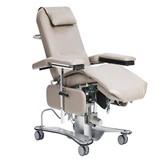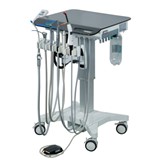Alfred Deakin Professor Marita McCabe, Director of Deakin’s Centre for Mental Health and Wellbeing Research, has found that nearly a quarter of aged care residents suffer from clinical depression, yet more alarmingly, only half of those with depression are actually diagnosed and even fewer receive treatment.
"This means that many people are leading a fairly miserable existence within the aged care system, and that’s not good enough," Professor McCabe said.
"Studies have shown that depressed aged care residents, as well as having a poorer quality of life, have a shorter lifespan. And this is after having contributed to society all their working lives. I think they deserve better.
"It is time for aged care staff and management, as well as government, to work together to fulfil their duty of care to the psychological, as well as the physical welfare of our elderly."
Professor McCabe and her team have looked into the problem at a number of Victorian aged care facilities (in partnership with Benetas and Uniting Aged Care) and found that staff were largely unaware of the problem of depression amongst their residents and that management within the facilities was also oblivious to this 'silent epidemic'.
"This was worsened by the fact that the residents themselves didn’t speak up because they don’t like to talk about their mood problems, they don’t want to cause trouble, they are embarrassed by their depression, and they see it as a normal part of ageing which, let me hasten to add, it is not!" Professor McCabe said.
"A further complication was that some of the residents also had Alzheimer’s disease and for those with an advanced stage of the disease, their behaviour had deteriorated and was quite disruptive. As a consequence, many were heavily sedated so that they were no longer a danger to themselves or others - but this also masked other psychological problems such as depression."
The researchers have worked with the aged care agencies to find a solution to both the hidden depression amongst residents and the challenging behaviour.
"We found that by training staff to detect and manage depression among residents, and also by training management to support staff in this task, we were able to significantly reduce the rate of depression, drug use and challenging behaviour," she said.
"We also developed a new diagnostic tool (the BPSD Assessment Measure) that helped enormously in the detection and treatment of psychological problems by staff and referral of the problem to clinicians or specialist nurses when required.
"The staff saw this as a positive development because it helped them to do their task more effectively. As for management, they could see - along with the relatives of residents - that the residents were being better cared for… it really was a win-win situation."
Professor McCabe also found that having staff mental health "champions" on hand helped quite a bit.
"The use of champions is the most efficient and cost-effective way of overcoming barriers to the introduction of new routines into aged care," Professor McCabe said.
"We showed that mental health champions, staff motivated to be vigilant about residents’ psychological state, were able to introduce new practices into the centre and make it part of the staff duties. It provided a hurdle over the organisational barriers," she said.
But more remains to be done. For example, despite introducing these new techniques of detecting depression in aged care residents, Professor McCabe found that they were not being used by staff.
"We found a number of organisational barriers at the coal-face, so to speak. This is despite showing that it would improve things for the residents and make staff members’ jobs easier," she said.
"We are currently working with management teams to see how we can get them on-board. First we will need to get their perspectives on the problem, and then we’ll see what strategies will encourage management to actually become part of the ‘clinical leadership’ team.
"I think people need to realise that the problem won’t go away by itself, and that while it might be your mum, dad, uncle or aunt today, tomorrow it could be you…"
















-160x160-state_article-rel-cat.png)
